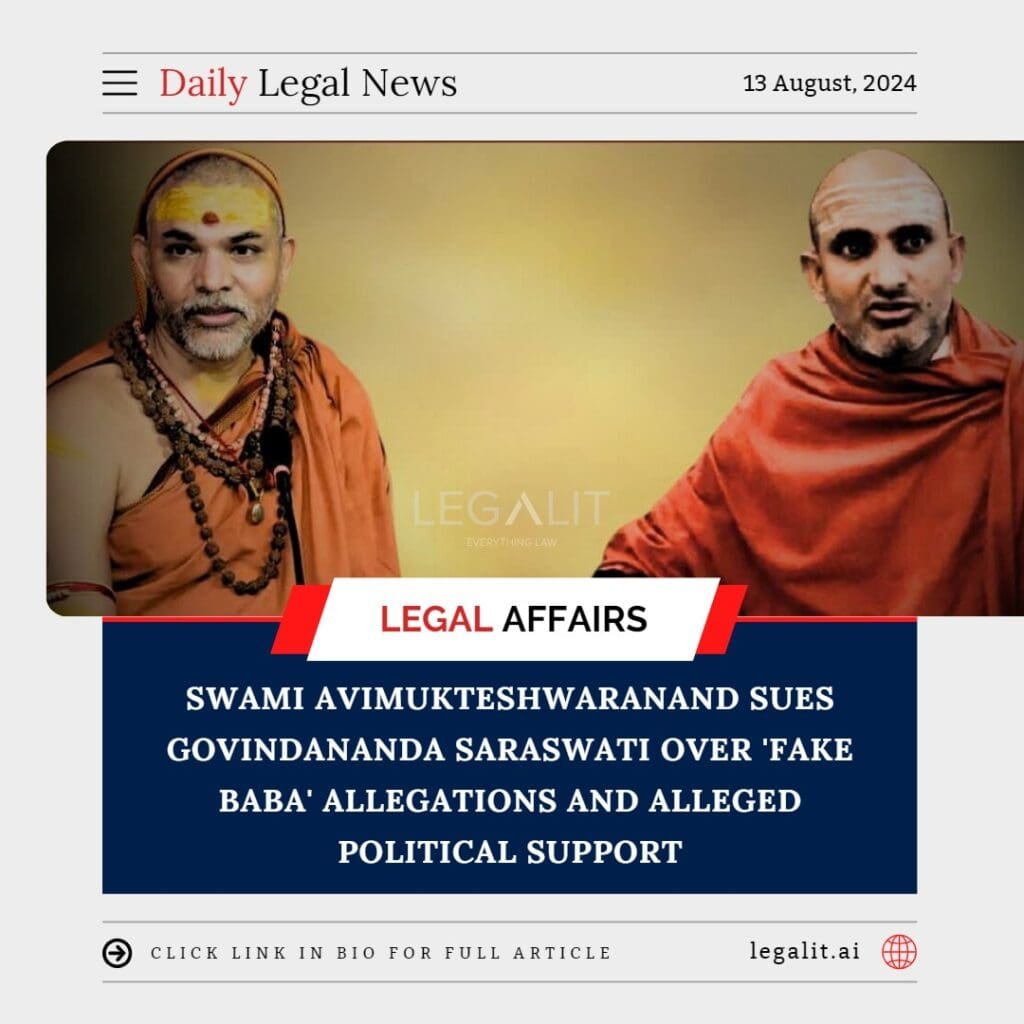
In a legal battle that has captured the attention of religious and political circles, Swami Avimukteshwaranand has filed a lawsuit against Govindananda Saraswati, accusing him of defamation. The case centers around Govindananda Saraswati’s public remarks, in which he allegedly referred to Swami Avimukteshwaranand as a “fake baba” and claimed that he is supported by the Indian National Congress, a major political party in India.
Background of the Dispute
Swami Avimukteshwaranand and Govindananda Saraswati are both prominent religious figures in India, known for their influence in spiritual and religious communities. The feud between the two escalated when Govindananda Saraswati reportedly made statements in public forums, questioning the authenticity of Swami Avimukteshwaranand’s spiritual status and accusing him of being a “fake baba” who is politically aligned with the Congress party.
These allegations have serious implications, as they not only challenge Swami Avimukteshwaranand’s reputation as a religious leader but also insinuate a connection with political forces, which could undermine his standing in the religious community.
Legal Action Taken
- Defamation Lawsuit: Swami Avimukteshwaranand has responded to these allegations by filing a defamation lawsuit against Govindananda Saraswati. In his lawsuit, he asserts that the statements made by Govindananda are false and have caused significant harm to his reputation, both as a spiritual leader and in the eyes of his followers.
- Claim for Damages: The lawsuit likely includes a claim for damages, seeking compensation for the reputational harm and distress caused by the defamatory remarks. Swami Avimukteshwaranand may also seek a public apology or retraction from Govindananda Saraswati.
- Legal Grounds: The legal action is based on the principles of defamation under Indian law, which protect individuals from false statements that can harm their reputation. If Swami Avimukteshwaranand can prove that the statements were made with malicious intent and caused damage to his reputation, he may succeed in his claim.
Implications of the Case
The lawsuit filed by Swami Avimukteshwaranand has several significant implications:
- Impact on Religious Communities: The case could have a profound impact on the religious communities associated with both leaders. The outcome may influence the followers’ perceptions and could lead to further polarization within these groups.
- Public Perception: The case brings to light the intersection of religion and politics in India, particularly the role of spiritual leaders in public discourse and their perceived political affiliations. The allegations of political support could affect how Swami Avimukteshwaranand is viewed by both his followers and the general public.
- Legal Precedent: The outcome of this case could set a precedent for how defamation claims involving religious figures are handled in Indian courts. It could also clarify the legal boundaries for public discourse concerning religious leaders.
- Media and Public Scrutiny: Given the high-profile nature of the individuals involved, the case is likely to attract significant media attention. The proceedings and their outcomes will be closely watched, potentially influencing public discourse on the role of religion and politics in India.
Moving Forward
As the case proceeds through the legal system, several factors will be important:
- Evidence Presentation: Both parties will need to present evidence supporting their claims. Swami Avimukteshwaranand will need to demonstrate the harm caused by the statements, while Govindananda Saraswati may argue the truth or context of his remarks.
- Judicial Interpretation: The court’s interpretation of defamation law in this context will be crucial. It will need to balance the right to free speech with the protection of an individual’s reputation, particularly in the sensitive area of religious identity.
- Possible Settlement: There is a possibility that the case could be settled out of court if both parties agree to terms that include a retraction or apology, potentially avoiding a protracted legal battle.
- Impact on Followers: Both leaders will need to manage the impact of the case on their followers, ensuring that the dispute does not lead to further division or conflict within their communities.
Conclusion
The defamation lawsuit filed by Swami Avimukteshwaranand against Govindananda Saraswati over allegations of being a “fake baba” supported by the Congress party highlights the complex interplay between religion, reputation, and politics in India. As the case unfolds, it will have significant implications for both religious leaders and their followers, as well as for the broader discourse on the role of spiritual figures in public life. The legal proceedings will be closely watched, not only for their immediate outcome but also for their potential impact on the relationship between religion and politics in India.